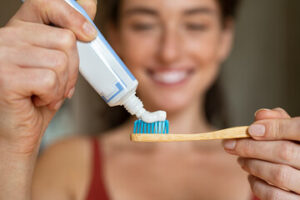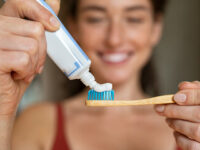Remineralizing Toothpaste
Your teeth are constantly at risk of demineralization from bacteria, acids in food and drinks, and the environment. Over time, this can lead to sensitive teeth, gum disease, and tooth decay.
Remineralizing toothpaste formulas can help to remineralize teeth and reduce the risks of these problems. These formulas typically contain hydroxyapatite, which is as effective as fluoride at stopping demineralization in teeth. Visit https://www.thelittlehomesteadco.com/ to learn more.
The enamel of your teeth is the hard, shiny outer layer that protects the inner dentin. This enamel is actually made of microscopic mineral crystals that are constantly being remineralized and demineralized by the mouth’s bacteria. If there are more demineralizations than remineralizations, the result is a cavity. Remineralizing toothpastes are designed to give you a little extra help with this process so that tooth enamel can stay healthy.
The best remineralizing toothpastes contain ingredients such as calcium phosphate and stannous fluoride. These ingredients mimic the natural process of remineralization by bringing minerals back to weakened teeth, making them stronger and more resistant to decay. These ingredients also help fill in the tiny cracks and fissures that develop on the surface of teeth during demineralization, keeping bacteria from slipping in and damaging the tooth’s enamel.
Another important ingredient in a remineralizing toothpaste is saliva. The proper acid/alkaline balance (also known as the pH level of saliva) is critical to remineralization. Saliva with a high pH level is mineral-rich and stimulates the remineralization of teeth. You can promote saliva production by drinking water, brushing frequently and limiting sugary foods and drinks. Some natural sweeteners, such as xylitol, are also proven to increase saliva flow and encourage remineralization.
Toothpaste with hydroxyapatite is another good option for remineralizing teeth. Studies have shown that hydroxyapatite can form a barrier on teeth surfaces and resist the action of bacteria that leads to tooth decay. It can also fill in those tiny cracks in the enamel that lead to sensitivity.
Keep in mind that remineralizing toothpastes take some time to work. A few weeks of regular use is usually enough to see results. If you are concerned about your enamel’s health, talk to your dentist. They may recommend a prescription remineralizing toothpaste for you that will deliver results more quickly. They may also be able to prescribe an over-the-counter product that is better suited for your needs. They can determine how much remineralizing toothpaste is appropriate for you based on your specific needs and history of tooth decay.
Fluoride
Many remineralizing toothpastes contain fluoride, which helps teeth become stronger and less prone to tooth erosion and decay. It also increases the absorption of minerals deep into tooth enamel, where it can help repair existing white spots or other damage. These ingredients, along with proper oral hygiene habits and a diet low in sugary foods and drinks, can help prevent or reverse tooth damage, including sensitivity to hot and cold and small cavities.
While remineralizing toothpaste can strengthen and protect teeth, it isn’t a replacement for regular dental care visits. A dentist can spot and treat advanced tooth damage, like a cavity or gum disease, before it becomes more severe. It’s also important to brush for at least two minutes, twice a day, in order to get the most benefit from your remineralizing toothpaste.
The best remineralizing toothpaste contains ingredients that have undergone clinical trials and can strengthen and rejuvenate the mineral content of teeth. These include hydroxyapatite, calcium sucrose phosphate, and zinc hydroxyapatite. The first ingredient, hydroxyapatite, has been found to bond to weakened tooth enamel and restore it. Hydroxyapatite can also fill in the tiny tubules that lead to nerves inside a tooth, reducing sensitivity to touch, temperature and food.
In a recent study, Tschoppe et al. compared the remineralizing effects of HAP toothpaste formulations with and without fluoride on bovine incisor dentin and enamel lesions. After two weeks, remineralization was measured using transverse microradiography. Results showed that all three HAP toothpaste formulations were able to improve the mineral content of enamel and dentin lesions. However, the HAP toothpaste containing zinc hydroxyapatite had the greatest remineralizing potential.
The best remineralizing toothpaste brands also contain other ingredients to protect the health of the gums and teeth, including natural extracts that are anti-inflammatory, xylitol to fight bacteria, and baking soda for gentle whitening. They are free of artificial coloring, saccharin, and sodium laurel sulfate, which can be harmful to teeth. These ingredients, along with proper oral hygiene and a healthy diet, can help keep teeth strong, healthy and beautiful.
Saliva
Besides fluoride, saliva is one of the most important components in remineralizing teeth. Saliva naturally adds minerals like calcium and phosphate to teeth that help prevent demineralization. It also has cleansing and antibacterial properties. The right acid/alkaline balance (also known as the pH level) in saliva is another vital factor in remineralizing teeth. Tooth enamel is prone to demineralization when the pH drops, and remineralization only occurs when it rises. Achieving this back-and-forth cycle is the key to preventing tooth decay and cavities.
Many factors contribute to demineralization, including the food you eat, your oral health habits, and your stress levels. A diet high in sugar and starch, for example, can erode teeth. In addition, stress may cause a dry mouth that can increase your risk of tooth decay by lowering saliva flow and the mineral content of your teeth.
Remineralizing toothpastes contain ingredients such as hydroxyapatite that can strengthen teeth and make them less sensitive to hot and cold foods. These products can be used along with other best practices, such as brushing twice a day and flossing once. You should also avoid eating acidic foods and sipping sugary drinks, and visit your dentist regularly to prevent cavities.
A remineralizing toothpaste should contain a natural sweetener such as xylitol that has two beneficial effects: it starves bacteria of sugar and increases saliva flow. This combination decreases tooth decay by reducing the acid that promotes bacterial growth and plaque buildup.
The remineralizing toothpaste you choose should also contain a natural antibacterial and fluoride. Clove essential oil is a natural antibacterial that helps keep your gums healthy and your teeth strong. It can be a great alternative to conventional toothpastes with added artificial sweeteners, such as sugar.
This remineralizing toothpaste recipe includes a mixture of glycerin, baking soda, coconut oil, and xylitol. You can use a food processor or blender to combine all the dry ingredients. To liquefy the coconut oil, you can heat it in a small pot on the stove until it is fully melted. You can then stir it into the other ingredients, making sure everything is well combined.
Diet
Feed your teeth daily with minerals and fend off sensitivity and decay. This fluoride-free, glycerin-free toothpaste is made with calcium carbonate, magnesium, bentonite clay, xylitol and Himalayan salt. It also contains mentha spicata (organic peppermint) oil, melaleuca alternifolia (organic tea tree) oil and Syzygium aromaticum (clove) oil. It is also infused with natural probiotics that reduce bacteria and promote healthy gums.
The best remineralizing toothpaste should contain the mineral hydroxyapatite, which makes up 97% of healthy enamel and has been shown to be as effective as fluoride in relieving tooth sensitivity and preventing calcification, according to an internationally published study led by a UT Health San Antonio School of Dentistry professor and researcher. Using remineralizing toothpaste that contains hydroxyapatite is an easy and cost-effective way to re-mineralize porous and moderately degraded teeth, reducing tooth sensitivity and improving overall oral health.
Tooth demineralization can be caused by many things, including a high-stress lifestyle and a Western diet that is rich in sugar and acidic foods. Remineralization can also be aided by the addition of a low-sugar, high-mineral and fat-soluble vitamin-rich food such as cheese and other dairy products. Maintaining a proper oral hygiene routine with the help of remineralizing toothpaste can also assist in the remineralization process by helping to eliminate plaque and prevent acid erosion, making it easier for saliva to repair and re-mineralize tooth enamel.
The key to remineralization is not complicated, although it does take a commitment to change some habits and add some new ones. Two easy daily habits that are simple to start with are switching to a remineralizing toothpaste and eliminating added sugar from your diet. Changing these two habits can make an immediate difference in your oral health, while also improving your overall wellbeing.




